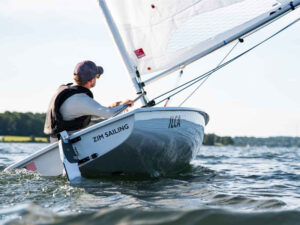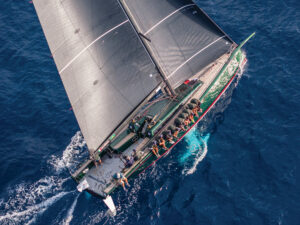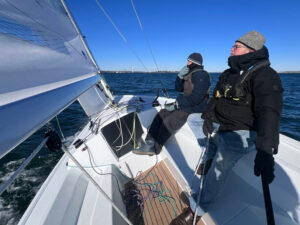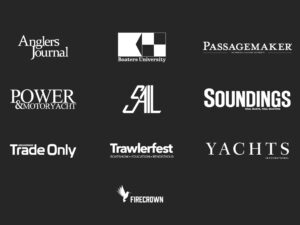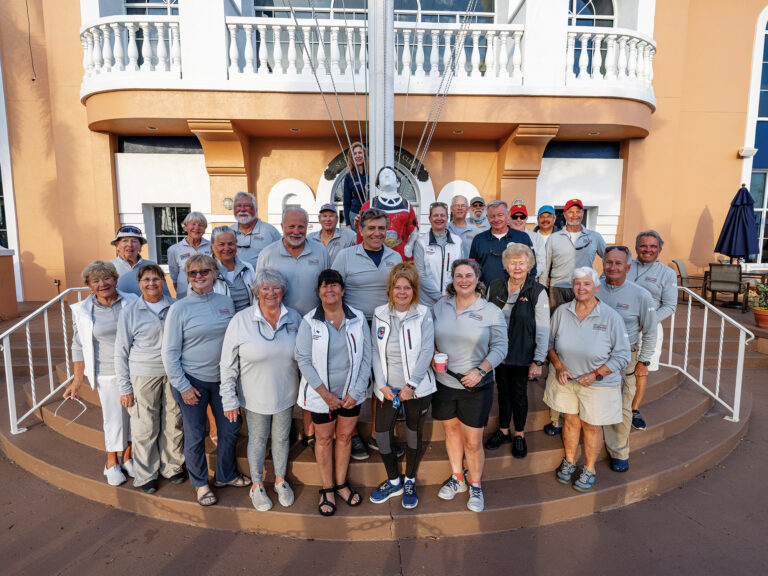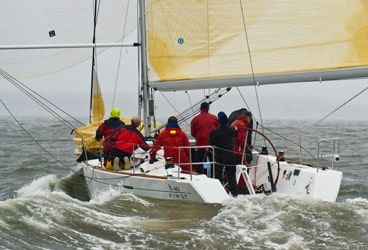
Beneteau First 40 BOTY 368
The best way to test a boat is at the extremes, and the Beneteau First 40, an “IRC optimized” production boat, got the best of what the Chesapeake Bay could offer-25 knots and a stacked Chesapeake Bay chop. Afterwards, one comment was unanimous among the judges: “impressive.” And, ultimately, their take on the boat was decisive: for an owner seeking a true dual-purpose boat to campaign at the big IRC events and get away once a season for a week of legitimate cruising, this boat has all the right stuff-and for the right price, too.
“The boat sailed like dream,” said Allen, who pegged the speedo at just over 11 knots, sawing the big wheel and carving down steep waves. “Upwind, it was excellent-it locked into its polars, between 7.2 to 7.4 knots, and it wouldn’t fall out. It just rumbled through the waves.”
Stewart agreed, adding, “It’s a big, heavy, powerful boat, and there wasn’t a creak or a moan the entire time.”
IRC encourages dual-purpose boats with full accommodations and lower-cost aluminum rigs, and to this end, the First 40 is fully compliant. With an experienced factory team and serious tooling capability in France, Beneteau has created the perfect, production-built 40-foot crossover. You’d almost feel guilty abusing it on the racecourse.
It hits the scales at nearly 16,000 pounds, which may seem high compared to similar-sized models from a decade ago, but this is the nature of IRC. The judges felt Beneteau and Farr Yacht Design took advantage of this trend and came away with a stiff, solid boat with an excellent finish on deck and below. It’s endorsed IRC rating [in Europe, and as sailed with the deep keel option], by the way, is 1.087.
“One thing that really impressed me is the detailing,” said Holby. “Jammed into this thing you’ve got a big forward stateroom, and port and starboard settees. The molded non-skid is great, and the finish in the cabinetry is excellent everywhere. There’s a lot of boat here, and it’s a big step up quality-wise for Beneteau.”
One example of its dual-purpose character is the inclusion of removable cockpit boxes; once they’re pulled, the cockpit becomes expansive, and jib trimmers will appreciate standing access to the primaries, which are at waist height and easy to work. The same goes for the pit crew; the companionway entrance is deep, so he or she can keep clear of the cockpit chaos. “All the positions were set up really well [ergonomically],” said Allen. “The pit, trimming, mast, and bow were all easy to work.”
The test boat was the first production hull to arrive in the States, and had yet to sail a regatta. The judges pointed out minor improvements that would be easy upgrades: foot chocks for the main trimmer, for example. The wooden toe rail, which is excessively high, runs from the foredeck to the cockpit, so owners would do well to invest in padded shorts for the crew if they expect them to hike for very long.
Judges’ P.O.V.
• Superb build quality and tooling
• IRC-friendly hull shape and rig
• Stiff in strong winds, easy to
control
• Deck layout spreads out crew for
maneuvers
• Legitimate cruising amenities
Test conditions: 25 knots, steep chop
Recommended use: IRC or PHRF
racing, occasional cruising
Recommended race crew: 8-10
Stats: LOA 41’3″ Beam 12’9″
DSPL 15,895 lbs. Ballast 6,610 lbs.
SA (upwind) 1,055 sq. ft.
Price (as sailed): $300,000
Contact: www.beneteauusa.com

